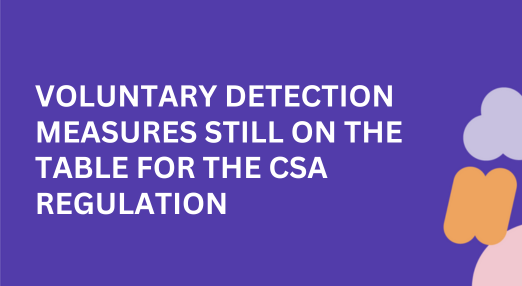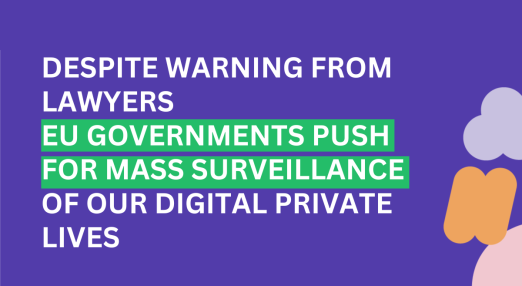Voluntary detection measures still on the table for the CSA Regulation
Whilst the draft EU CSA Regulation is intended to replace current voluntary scanning of people's communications with mandatory detection orders, lawmakers in the Council and Parliament are actively considering supplementing this with "voluntary detection orders". However, our analysis finds that voluntary measures would require a legal basis in the CSA Regulation, which would likely fall foul of the Court of Justice. Content warning: contains discussions of child sexual abuse and child sexual abuse material
Filter resources
-

Voluntary detection measures still on the table for the CSA Regulation
Whilst the draft EU CSA Regulation is intended to replace current voluntary scanning of people's communications with mandatory detection orders, lawmakers in the Council and Parliament are actively considering supplementing this with "voluntary detection orders". However, our analysis finds that voluntary measures would require a legal basis in the CSA Regulation, which would likely fall foul of the Court of Justice. Content warning: contains discussions of child sexual abuse and child sexual abuse material
Read more
-

LIBE Committee’s opinion fails to include a total ban on the use of spyware in the European Media Freedom Act
EU Parliament's LIBE committee voted on its position on the European Media Freedom Act (EMFA) and failed to call for a total ban on the use of spyware against journalists.
Read more
-

EU Parliament’s position on Directive combatting gender-based violence a step in the right direction, with some misses on protecting privacy
Last week, the European Parliament agreed to their final position on the directive on combatting violence against women and domestic violence. While the overall outcome is a positive step towards safeguarding the rights of women and LGBTQ+ people online, the EU failed once again to account for encryption as a key tool to protect the privacy of threatened groups.
Read more
-

All eyes on EU: Will Europe’s AI legislation protect people’s rights?
As the EU’s AI Act moves into the final phase of negotiations, key battles arise for the protection of human rights.
Read more
-

EDRi-gram, 12 July 2023
Keeping up with the fast-paced digital rights world is hard work, so we’re taking a well-deserved summer break. But there’s lots to update you on before we go. In this EDRigram, you can read about the ongoing efforts in the EU and the UK to protect encryption and keep the safety and integrity of everyone’s private communications intact. You can also read about what EU’s plans to digitise travel documents could mean for you – more convenient travelling or more discrimination? Since this is the last edition of the EDRigram before we break for the summer, we have an extended recommendation section to keep you from from missing us while we’re away. Have a great summer!
Read more
-

Civil society calls on EU to protect people’s rights in the AI Act ‘trilogue’ negotiations
As EU institutions start decisive meetings on the Artificial Intelligence (AI) Act, a broad civil society coalition is urging them to prioritise people and fundamental rights in this landmark legislation.
Read more
-

Open letter: Hundreds of scientists warn against EU’s proposed CSA Regulation
Over 300 security researchers & academics warn against the measures in the EU's proposed Child Sexual Abuse Regulation (CSAR), citing harmful side-effects of large-scale scanning of online communications which would have a chilling effect on society and negatively affect democracies. The letter remains open for signatures.
Read more
-

Despite warning from lawyers, EU governments push for mass surveillance of our digital private lives
Whilst several EU governments are increasingly alert to why encryption is so important, the Council is split between those that are committed to upholding privacy and digital security in Europe, and those that aren’t. The latest draft Council text does not go anywhere near far enough to make scanning obligations targeted, despite clear warnings from their own lawyers.
Read more
-

Press Release: The EU’s Internal Market Committee votes for protecting encryption in the CSA Regulation
The European Union’s Internal Market and Consumer Protection (IMCO) Committee becomes the fourth European Parliament Committee to adopt an opinion on the European Union Child Sexual Abuse (CSA) Regulation, voting to protect encryption and rule out unacceptably risky technologies.
Read more
-

Spotify gets fine of € 5 Million for GDPR violations
Following an EDRi member noyb complaint and litigation over inactivity, the Swedish Data Protection Authoirty (IMY) has issued a fine of 58 Mln Swedish Crown (about € 5 Million) against Spotify.
Read more
-

Guarding health data privacy in Europe: The limits and challenges of current regulations
The GDPR demonstrates the capacity of the European Union to prioritise data protection and privacy. The collection and use of health data by private corporations makes privacy protections critically important. Taken together, the provided policy recommendations here create comprehensive steps forward.
Read more
-

Encryption protects our rights, privacy is not a crime
End-to-end encryption is currently under attack by prosecutors and legislators in France, the EU, the UK and the US. We are asked to choose, as a society: do we accept a future in which our private mail and communication can be intercepted anytime, in which we are treated as potential suspects?
Read more
